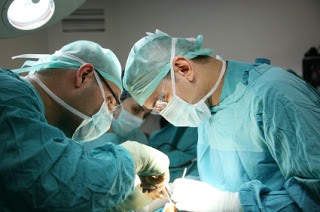 You’ve been diagnosed with a thyroid condition and your doctor has suggested thyroidectomy surgery as a possible treatment. Now you have questions: What is the thyroid? Why might I need surgery? What could it accomplish?
You’ve been diagnosed with a thyroid condition and your doctor has suggested thyroidectomy surgery as a possible treatment. Now you have questions: What is the thyroid? Why might I need surgery? What could it accomplish?
To answer the first question, the thyroid is a gland located in your throat. It’s one of the endocrine glands, a system of glands that includes the pineal, the adrenal and the pancreas. Together they keep the body’s many internal systems from falling out of whack.
The thyroid, for its part, produces hormones that regulate blood calcium levels, metabolism, energy use and protein generation. These hormones are essential for a balanced, healthy life. If they don’t work right, a thyroidectomy surgery may be necessary.
Times when thyroidectomy surgery is needed
There are several thyroid conditions that can require surgery. Cancer is the most frequent. It’s not terribly common, but it’s not rare either, and it’s eminently survivable: Ninety-seven per cent of patients survive the first five years following treatment.
Thyroiditis, or inflammation of the thyroid, is another reason for surgery to remove the gland. The most common form of this disease is Hashimoto’s thyroiditis, an autoimmune disorder. Surgery usually isn’t indicated, but it can be helpful in a small number of cases.
Thyroidectomy surgery might also be used to remove neck goitres and other abnormal growths on the thyroid. And it is often used to treat hyperthyroidism, a relatively common affliction in which the thyroid produces too much of its critical hormones.
What results is a long list of symptoms that can be confused with any number of other illnesses: anxiety, irritability, weight loss, sleep problems, diarrhoea and many others. These are commonly mistaken for symptoms of exhaustion and clinical depression, which can lead to long delays in appropriate treatment.
So what should you expect of your thyroidectomy surgery? Assuming you have an experienced thyroid surgeon, it should go very smoothly. You may need a total thyroidectomy, involving complete removal of the gland, or a partial thyroidectomy, involving removal of only a portion. The former takes about an hour and a half on average, with less time needed for a partial removal.
If you need a total thyroid removal, you should know that you will require long term thyroid hormone replacement therapy. This treatment consists of a daily pill. Most people need to take thyroid hormone pills (thyroid hormone replacement) for the rest of their lives when the whole gland is removed. You may also need thyroid hormone medication even if you undergo only a partial thyroidectomy surgery.
You will probably go home a day or two after surgery. You must be able to drink liquids before you can go home.
Your doctor will probably check the calcium level by taking a blood test after surgery. This is done more often when the whole thyroid gland is removed.
After thyroid surgery you will have some neck pain. Most patients are able to get up and walk on the day after surgery. It should take about 3 to 4 weeks for you to fully recover. The outcome of thyroid surgery is usually excellent.
If you have questions about thyroid surgery make an appointment to see our thyroid surgeon.
